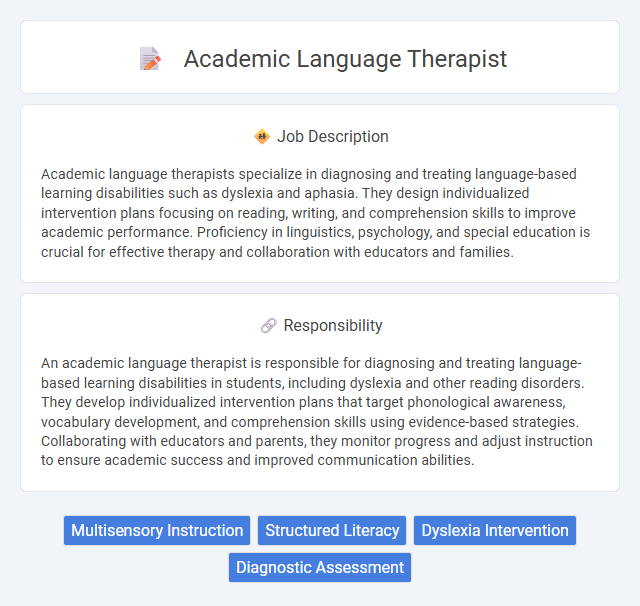
Academic language therapists specialize in diagnosing and treating language-based learning disabilities such as dyslexia and aphasia. They design individualized intervention plans focusing on reading, writing, and comprehension skills to improve academic performance. Proficiency in linguistics, psychology, and special education is crucial for effective therapy and collaboration with educators and families.
Individuals with strong communication skills and a passion for helping those with learning difficulties are likely suitable for a role as an academic language therapist. Those who demonstrate patience and adaptability may find it easier to support clients with dyslexia, language processing disorders, or other learning challenges. However, people who prefer quick results or minimal interaction might struggle in this profession.
Qualification
An Academic Language Therapist typically requires a master's degree in language therapy, speech-language pathology, or education with a specialization in language development and literacy. Certification from recognized bodies such as the Academic Language Therapy Association (ALTA) enhances professional credibility and ensures adherence to evidence-based practices. Extensive training in diagnosing and remediating language-based learning disabilities, combined with experience in multisensory teaching methods, is essential for effective intervention.
Responsibility
An academic language therapist is responsible for diagnosing and treating language-based learning disabilities in students, including dyslexia and other reading disorders. They develop individualized intervention plans that target phonological awareness, vocabulary development, and comprehension skills using evidence-based strategies. Collaborating with educators and parents, they monitor progress and adjust instruction to ensure academic success and improved communication abilities.
Benefit
An academic language therapist likely improves reading and writing skills for individuals with language-based learning difficulties, increasing their academic success. They may provide personalized interventions that enhance cognitive processing related to language, potentially boosting confidence and self-esteem in students. This role could offer the benefit of directly impacting lifelong learning and communication abilities, making a significant difference in clients' educational and personal development.
Challenge
An academic language therapist may likely encounter the challenge of addressing diverse learning needs and language impairments among students with varying cognitive abilities. The job probably requires adapting evidence-based interventions to effectively support individuals struggling with reading, writing, and communication difficulties. Navigating the complexity of integrating therapeutic strategies within academic settings could consistently test problem-solving and collaboration skills.
Career Advancement
Academic language therapists with specialized certifications and advanced degrees can pursue leadership roles such as program coordinators or clinical directors in educational and healthcare settings. Gaining expertise in dyslexia intervention techniques and staying current with evidence-based practices enhances opportunities for consulting or private practice expansion. Continuous professional development through workshops and memberships in organizations like the Academic Language Therapy Association boosts career growth and credibility.
Key Terms
Multisensory Instruction
Academic language therapists utilize multisensory instruction techniques to support students with language-based learning differences, engaging auditory, visual, and kinesthetic pathways simultaneously. This approach enhances reading, writing, and spelling skills by reinforcing neural connections critical for language acquisition and processing. Mastery of structured multisensory methods, such as Orton-Gillingham-based strategies, is essential for effective intervention and improved academic outcomes.
Structured Literacy
Academic language therapists specialize in Structured Literacy, a research-based approach that emphasizes explicit, systematic instruction in phonology, morphology, syntax, and semantics for struggling readers. They assess and tailor interventions to address language processing deficits, focusing on decoding, encoding, and comprehension skills. Expertise in Structured Literacy enables these professionals to support students with dyslexia and other language-based learning disabilities through targeted, multisensory teaching strategies.
Dyslexia Intervention
Academic language therapists specialize in diagnosing and providing evidence-based interventions for students with dyslexia, utilizing multisensory instructional techniques to improve reading, spelling, and writing skills. They conduct comprehensive assessments to identify language processing deficits and create individualized education plans tailored to each student's unique learning profile. Collaboration with educators, parents, and other specialists ensures consistent support and effective progress monitoring in dyslexia intervention programs.
Diagnostic Assessment
Academic language therapists specialize in conducting rigorous diagnostic assessments to identify language-based learning disabilities such as dyslexia, auditory processing disorders, and specific language impairments. These assessments include standardized tests, informal evaluations, and comprehensive case histories to pinpoint students' linguistic strengths and weaknesses. Their expertise in diagnostic evaluation supports tailored intervention strategies that foster academic success and language development.
 kuljobs.com
kuljobs.com